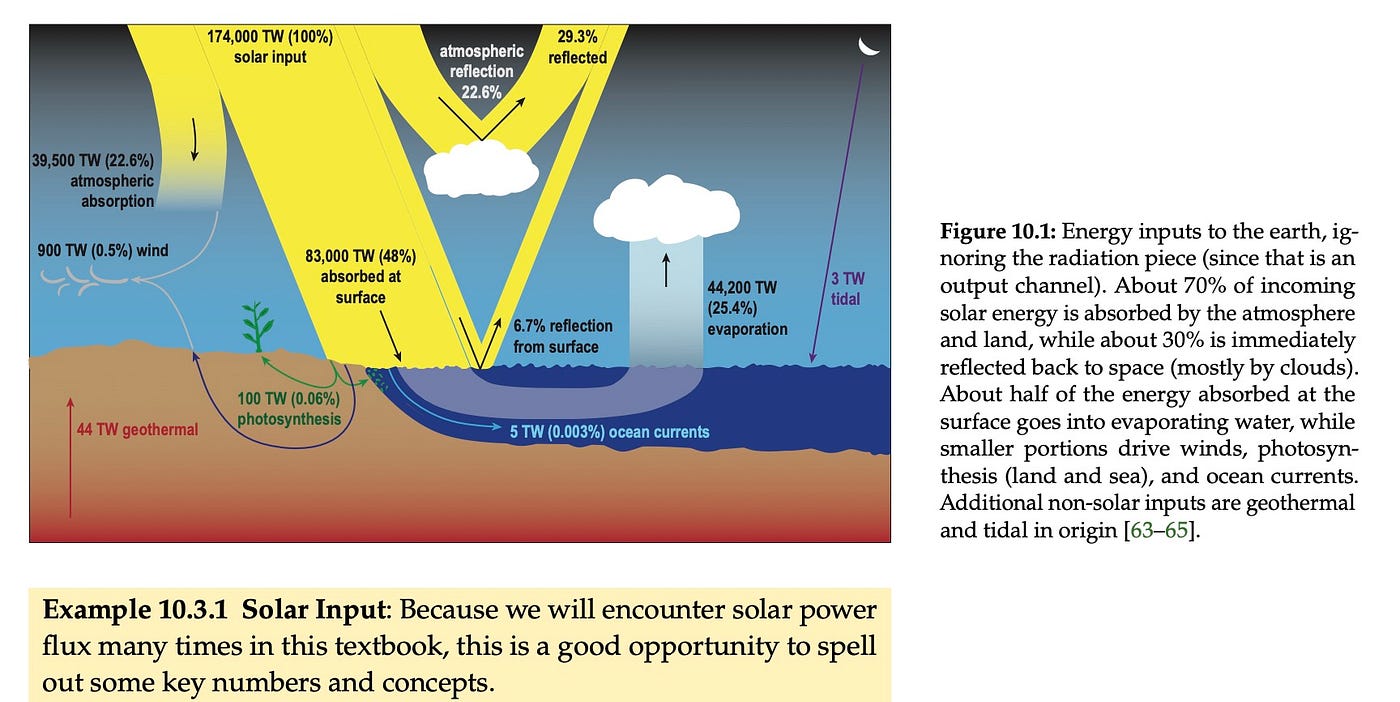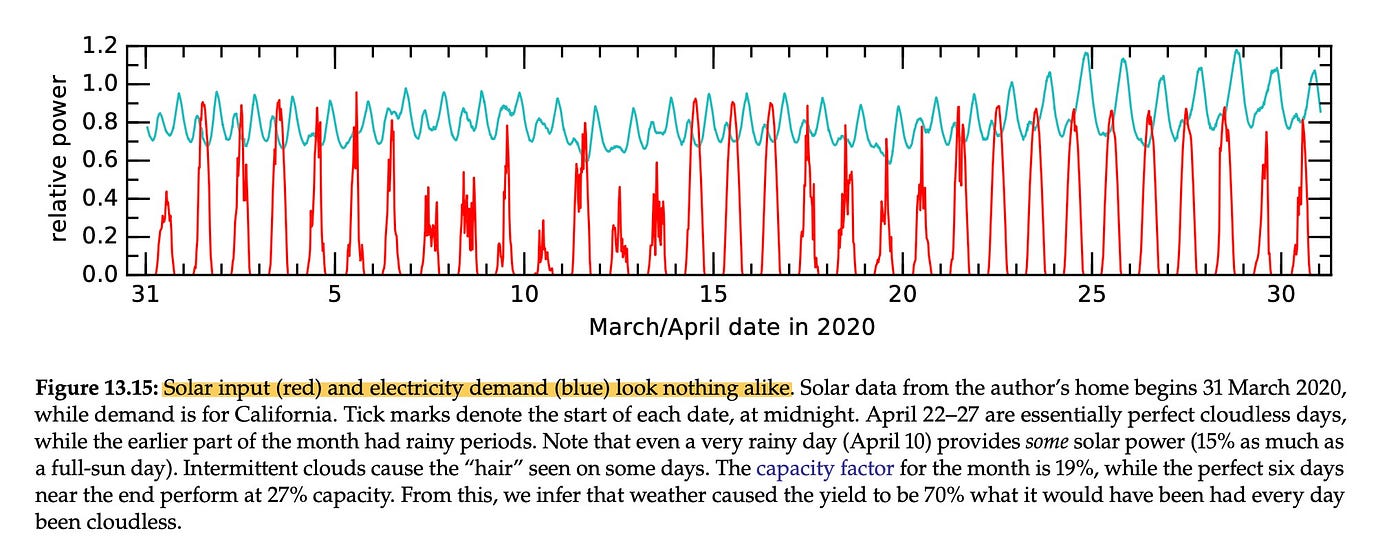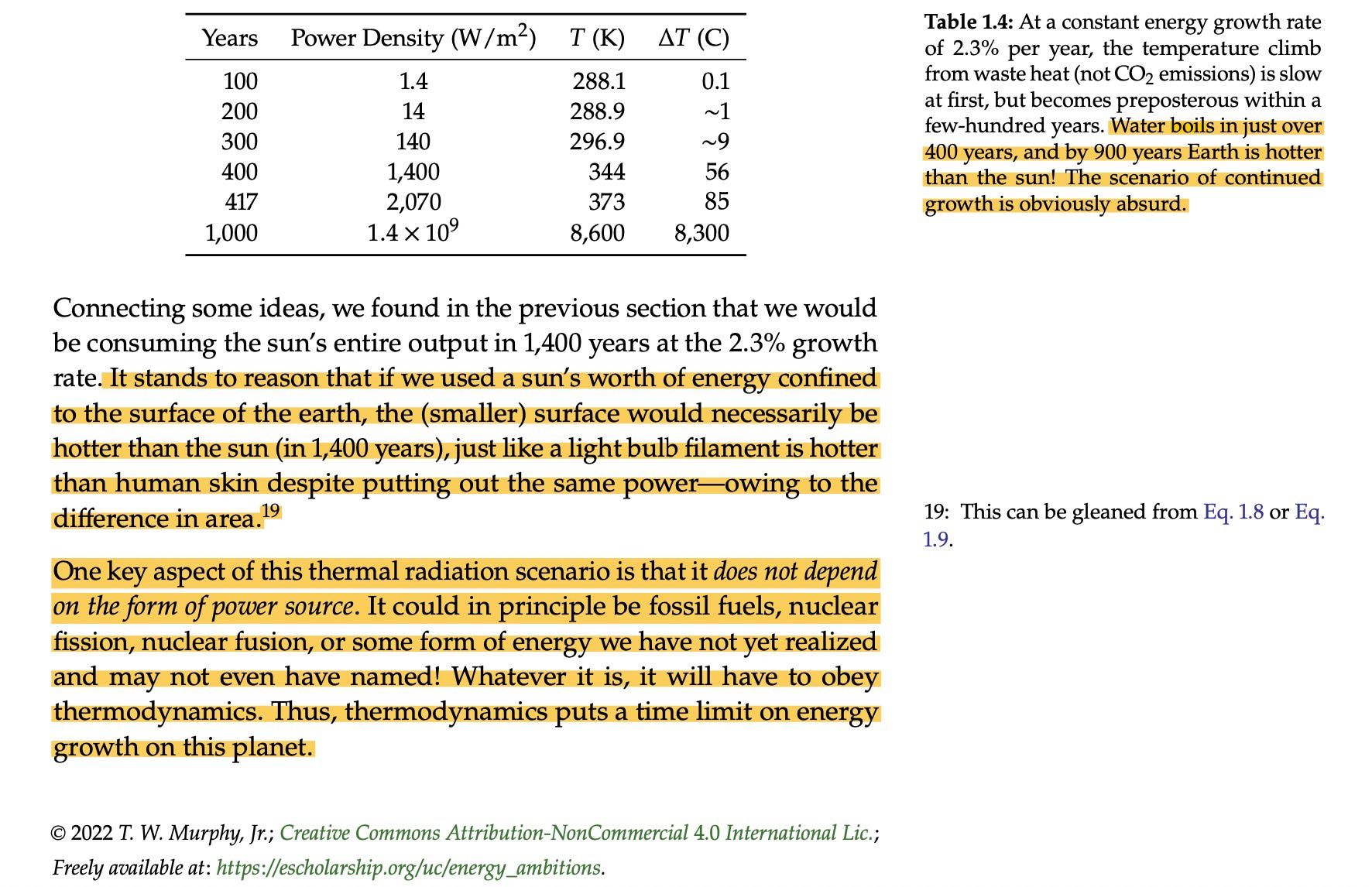Why Solar Won’t Save Us

I’ve got some good news and some bad news. The good news is that we get nearly 5,000X as much energy as we need from the sun. The bad news is that it’s the wrong type of energy for civilization as we know it, and we’re the the last civilization you’d want to give unlimited energy to anyways.
As Tom Murphy says in the textbook I’m cribbing from, “We have built up to our current state wholly in the context of cheap and available fossil fuels, and simply do not know if we can continue to live at a similar standard in a post-fossil world.” Murphy is being scientifically generous here. The upshot of his whole textbook is that we can’t.
More to the planetary point, if we somehow square this circle—being the tenacious cockroaches with guns we are—then the 800 other ways we’re destroying life would only accelerate. As Murph says“if energy became essentially unlimited by some technology, I shudder to think what it would mean for the rest of the planet.”
The Good News

First the good news. As Murphy says, “We already have a giant fusion reactor parked 150 million kilometers away that requires no mining, servicing, or any attention whatsoever. In this sense, the sun is essentially as inexhaustible as fusion promises to be, but already working and free of charge.”
Every time we swing around this fusion reactor it bathes us in 174,000 TW of energy, of which 83,000 hits the ground, where we can catch it. In order to get our total energy needs we’d need to cover 0.4% of the Earth in panels (which are already close to maximum efficiency), which sounds great until you realize “this is comparable to the amount of area currently covered by roads and buildings.” And would cost $100 trillion for 20 TW of delivered power. But nevermind that for now. Good news only!
The good news is that unlike fossil fuels (effectively exhausted in a century) and fissile uranium (also exhausted in a century), solar power is definitely renewable. Just swing around the reactor again, a trip we also get for free. Unlike wind (capable of little over 1TW) or hydro (worth maybe 2TW), we have more than enough. Unlike earthly fusion (forever 25 years away from being useful), solar power is usable now. Unlike tidal, it doesn’t risk driving away the moon. So far so good.
Solar technology is also advanced enough already and continues advancing. Current solar panels can capture energy at 15–20% efficiency, very close to the theoretical maximum of 33-ish%. Close enough. Solar thermal (ie mirrors) can provide heat and steam (ie, conventional power plant technology), though it only works when you can see your shadow (no clouds). Artificial photosynthesis doesn’t exist, but is possible. We’d have to build more than we’ve ever built and spend more than we can imagine, but it is possible. So what’s the problem?
The Bad News
The bad news comes in two parts. The first problem is that this civilization needs a certain type of energy, ie energy that works at night, fits in vehicles, and gets hot enough to make concrete, steel, etc. None of which solar is very good for. The second problem is that endless growth on a finite planet, whatever the energy source, still kills us. It’s like getting air-fried vs. boiled in oil, or electrocuted vs. burnt at the stake. Same result.
1. Client Expectations
This civilization is built around the promise of getting whatever you want whenever you want it, which solar simply cannot do. Honestly physics cannot do this, and solar impossibility is just an extension of that.
The sun is just not there half the day (intermittency) and it can’t power airplane or ships (as we understand them) at all. We could have a civilization that doesn’t do much at night, ships things by wind, and travels by Zepplin, but who wants that? We’re spoilt trust fund kids and we want private jets and next-day delivery and I’m afraid, putha, that this just isn’t possible.
INTERMITTENCY
‘But batteries’ you might say, but then we’re back to the same two problems. Doesn’t meet expectations and still melts the Earth. As Murphy writes:
“To illustrate the difficulty of storage, a lead-acid battery large enough to provide the United States with adequate backup power would require more lead than is estimated to be accessible in the world and would cost approximately $60 trillion at today’s price of lead. Lithium or nickel-based batteries fare no better on cost or abundance. Pumped storage is limited by a small number of suitable locales.”
So batteries just get us back where we started. While the sun may be a plentiful and renewable resource, battery storage is not. We could certainly have a different civilization, ie one where we don’t do much at night, but this requires basically inverting the current demand curve, which general peaks as the sun peters out.

Again, I’m not saying that a theoretical civilization could not adapt to this fundamentally different form of energy and, as they say, make hay while the sun shines. I’m just saying that this civilization is the geological equivalent of trust fund babies, and if they don’t get sparklers on their bottle of champagne, they’ll freak the fuck out.
TRANSPORT SHITTENCY
A battery-powered 737-equivalent would have to carry 300 tons of batteries (compared to 15 tons of fuel), making it little more than a giant paperweight, stuck on the ground. Or it would have to reduce its range to 200km, wherein you’d be better off taking a train. Either way, you’re grounded and basically not flying anymore, unless it’s a Zeppelin or something.
Even on the ground, batteries can’t move freight or shipping the way this civilization demands. A battery-powered freight-truck would have to use 85% of its cargo load for batteries (not acceptable) or hot-swap batteries or fast charge constantly. An electric ship couldn’t just chug around the ocean, it would have to hug the coastline either following an electric wire or stopping constantly to recharge. Even personal transport won’t be as simple as switching to electric cars. The personal vehicle is a fundamentally inefficient mode of transport and we’d have to depend much more on public transport. Is this possible? Yes, but it’s all much worse than fossil fuels. Things will suddenly cost more and be slower once our Sunk-Solar Sugar Daddy stops subsidizing us.
2. Inevitable Heat Death Of Growth
Murph’s text constantly asks the wrong question, which is how do we keep going the way we’re going without fossil fuels.
This book takes an approach that deliberately asks the wrong question, chapter after chapter: how can we keep going in a manner resembling the present form in the face of declining fossil fuel resources and/or a commitment to wean ourselves from fossil fuels as a mitigation strategy for climate change?
The simple answer to this question is NO. With COVID-19 it’s like God sent us a plague to show us how we actually needed to live (grounded, not consuming whatever we want, and frankly struggling) and we were just like ‘fuck it’ and kept rolling. We don’t get it (which is why I guess God sent 10 plagues to the pharaoh) but it will get us soon enough. Such is physics I suppose.
The best bargain thoughtful people can strike is that renewables will save us, ie a lot of solar supplemented by batteries and other sources (wind, nuclear). The question, however, is save what and save who? Because our children simply do not have this fossil fuel inheritance, and if they did have unlimited energy from some other source, they would just chew up the planet in a million different ways besides CO₂. As Murphy says:
The burden of proof is on those who argue for continued modernity: ample evidence indicates that humans can live in primitive relation to nature for tens of thousands of years, but no evidence demonstrates that it can survive in anything like the mode of the last century or two for very long. Even the universe fails to deliver evidence.
One of the many false assumptions the economic priests running this world make is that macroeconomics occurs in a vacuum and we can just keep growing forever. Like so much else in economics, this basic assumption isn’t questioned and people treat it like a religious belief that we must keep growing. What Murph simply does is ask the question (with basic math) and the answer is both unbelievable and irrefutable.

This of course grows into absurdity. Our current energy usage of 18 TW adds just 0.14W/m² to the solar input, but this increases by a factor of 10 each century with a (disappointing to economists) 2.3% growth rate. By 400 years we’re capturing all of the energy the sun drops on us (roughly 1,000 W/m²) and using it to power machines and whatever else. Waste heat goes from a completely negligible problem to worse than climate change. As Murphy says:
At first, the effect is unimportant, but in 300 years far outstrips global warming, and reaches boiling temperature in a little over 400 years! If we kept going (not possible), Earth’s temperature would exceed the surface temperature of the sun inside of 1,000 years!
Based on simple thermodynamics, any energy source produces heat waste, including solar. Any machine doing work, whatever the power source, produces heat waste (not to mention whatever else it’s trashing). Any exponential growth gets out of control real quick, even humble waste heat. Here’s the table above in Celsius so you (and I) can understand:

With continued growth from any power source, we’ll feel an uncomfortable temperature rise for 300 years, but by 417 the fucking oceans boil and the planet becomes Venus. Exponentials creep up on you real quick, ask Sessa and his chessboard. Indeed, it’s technically possible that we already did this to Venus—now swathed in runaway greenhouse gases—hopped over to Earth, and will trash Mars next. This is the inevitable heat death of growth.
And nevermind what we’d be using the energy for (ie, what work those Watts are doing). We’d be digging up other resources, taking more land from creatures, eating more sushi, satisfying more ambitions at the expense of other parts of the finite Earth. Heat is just one measure of the problems we cause, but even by that narrow measure we cannot go on like this. It’s just not physically, mathematically possible.
When I say ‘boil the oceans’ people think it’s absurd but I’m just quoting from a physics textbook. In the parable of Sessa and his chessboard he just doubles a grain of rice on a chessboard and is owed the entire kingdom by the end. It’s the question that’s absurd, not the answer. We simply can’t grow anything exponentially forever. Civilizationally speaking, we can fuck ourselves in more or less time, but the destination of unchecked growth (re: cancer) is always fucked.
That’s the fundamental problem with solar, which has nothing to do with the technology. We could build our society on zombie-treadmill energy and have the same issue. Keep doubling anything long enough and you’re in double trouble. Thus the most fundamental problem with solar is the underlying problem of growth.
Why Solar Won’t Save Us
This is why solar won’t save us. The real problem isn’t the answer, it’s the question. The problem is not technology, it’s about who we are and whether this growth-vision of civilization is saveable by anything. And it’s not. And it shouldn’t be. When Jesus comes back he’ll give us the flaming sword, if thermodynamics doesn’t give it to us first.
People want solar or renewables to keep powering the lifestyle they currently have and better and it’s just not possible. It’s the lifestyle that’s the problem, not the energy source. I get that powering your Bitcoin with renewables and getting Amazon delivered with an electric van is cool, but any energy use makes things hot, and if you keep growing the way everybody dreams about, it becomes hell on Earth quite soon. Even if we mitigate climate collapse, we still have the same problem.
Murphy’s textbook is called Energy and Human Ambitions on a Finite Planet and it’s the ambition that’s the problem, not the planet. As Murphy says, “clever geo-engineering ideas ring of hubris, and seem like solving a problem of hurtling toward the ground by digging a hole ahead of the fall fast enough to keep up. Our whole problem is that we have convinced ourselves that we can outsmart nature.” We want to have our planet and heat it too. And this you just can’t do. Bargain all you want with the latest technology and you just buy yourself a few centuries, a geological fart in the wind.
The fact is that we cannot keep growing the same cancerous way ‘except solar’. It’s like saying I’m going to switch lung cancer for eye cancer. I mean, still cancer. At some point we have to grow up and learn our place in the world, not forever trying to grow away from our living family to go fuck up Mars. It’s a hard lesson for trust fund babies to learn, but we’re getting a brutal lesson this century whether we want it or not. Best to crack open that old physics textbook and read up, on how, precisely, we’re fucked.